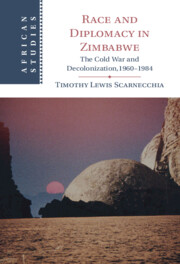Book contents
- Race and Diplomacy in Zimbabwe
- African Studies Series
- Race and Diplomacy in Zimbabwe
- Copyright page
- Contents
- Figures
- Acknowledgments
- Abbreviations
- Introduction
- 1 Historical Background
- 2 The Early 1970s
- 3 Liberation Struggles in Southern Africa
- 4 “We Don’t Give a Damn about Rhodesia”
- 5 Negotiating Independence
- 6 Negotiating Independently
- 7 The Big Gamble
- 8 The 1980 Elections and the First Years of Independence
- 9 Gukurahundi and Zimbabwe’s Place in the 1980s Cold War
- Conclusion
- Select Bibliography
- Index
- African Studies Series
1 - Historical Background
1960–1970
- Race and Diplomacy in Zimbabwe
- African Studies Series
- Race and Diplomacy in Zimbabwe
- Copyright page
- Contents
- Figures
- Acknowledgments
- Abbreviations
- Introduction
- 1 Historical Background
- 2 The Early 1970s
- 3 Liberation Struggles in Southern Africa
- 4 “We Don’t Give a Damn about Rhodesia”
- 5 Negotiating Independence
- 6 Negotiating Independently
- 7 The Big Gamble
- 8 The 1980 Elections and the First Years of Independence
- 9 Gukurahundi and Zimbabwe’s Place in the 1980s Cold War
- Conclusion
- Select Bibliography
- Index
- African Studies Series
Summary
This chapter sets the stage for the diplomatic history concerning the attainment of majority rule and independence in Zimbabwe. From the perspective of the early 1960s, many African nationalists believed that the British would assist them in the transition in ways similar to decolonization in Zambia and Nyasaland, but the Unilateral Declaration of Independence in November 1965 ended that possibility. The white minority government of Ian Smith imprisoned most of the African nationalist leaders in 1964, and it would not be another ten years until they were released to negotiate again. The ZANU–ZAPU split in 1963 was also a factor in the weakness of African nationalists, as was the continued animosity between the two parties as they tentatively commenced the armed struggle in the late 1960s. The rhetorical attacks flung back and forth in each party’s publications are examined, helping to demonstrate the historical animosities between the two factions.
Keywords
- Type
- Chapter
- Information
- Race and Diplomacy in ZimbabweThe Cold War and Decolonization,1960–1984, pp. 17 - 37Publisher: Cambridge University PressPrint publication year: 2021



